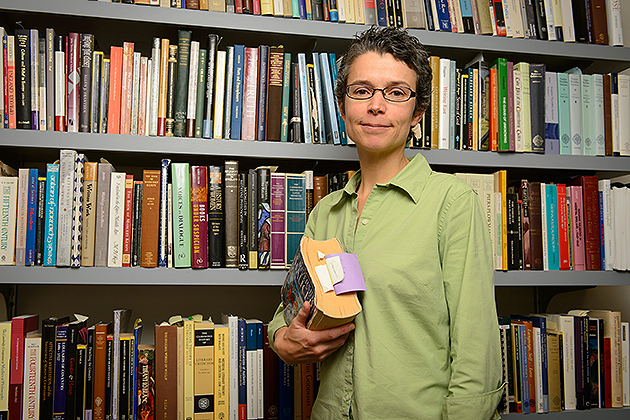
The voices of the Middle Ages are everywhere in Fiona Somerset’s office at UConn, filling hundreds of books that line her shelves and waiting inside the old microfilm rolls ready to be spooled into her reader in the corner.
Somerset, who joined UConn’s Department of English this year from Duke, says she has been fascinated throughout her career by connections between those long-ago voices and the issues facing people and society today.
Now, she’s bringing that curiosity and a wealth of expertise to UConn, drawn by its ambitious program to hire hundreds of new faculty members across the disciplines.
From Geoffrey Chaucer to William Langland to the mysterious “Pearl Poet,” Somerset is bringing their voices and those of their characters to a new generation of UConn students – and, she hopes, sparking in them the kind of contemplation that launched her own career.
While her hiring provides the obvious benefits to UConn of her notable pedigree in medieval studies and literature, it also fulfills Somerset’s wish to move from a private institution to a public university.
The diversity of the students’ experiences, the commitment of the faculty, the support of the administration, and the natural beauty of UConn’s campus closed the deal for her almost as soon as she made her first visit last winter.
“To be in a community where people know and support each other personally and professionally, and to be able to work with students at such a formative stage in their academic lives, is an incredible gift,” says Somerset, whose three children were as charmed by their UConn welcome packages as she was by the university’s academic and social climate.
They settled in immediately, with Somerset quickly learning the area’s trails and bicycle paths, getting season tickets for UConn soccer games, and navigating the Homer D. Babbidge Library and the interlibrary loan service that she calls invaluable to her continuing research.
She says she was also drawn by UConn’s commitment to the humanities and specifically medieval studies — a program that’s gained national attention due to the work of UConn Professor Emeritus Carl David Benson, Professor Bob Hasenfratz, Professor Frederick Biggs, Professor of Romance Studies Anne Berthelot, Associate Professor of History Sherri Olson, and many others whose reputation has preceded them.
She says she’s also especially happy and impressed that UConn this year hired Susan Einbinder, a professor of Hebrew and Judaic studies and comparative literature who came to Storrs under the new hiring initiative. Einbinder is joining UConn’s medieval studies faculty after a distinguished career at Hebrew Union College-Jewish Institute of Religion in Cincinnati.
As part of the leading edge of the faculty hiring program in CLAS, Somerset, Einbinder and other colleagues hired this year will be joined by 60 more new faculty members in all arts and sciences disciplines who will arrive next year, says Jeremy Teitelbaum, dean of the College of Liberal Arts and Sciences.
“Bringing Fiona Somerset, a widely recognized expert on spiritual movements and texts from the late medieval period, to UConn from Duke will build on our recognized strength in medieval studies,” he says.
Somerset, a native Canadian who started her college career studying violin at the Cleveland Institute of Music, transferred to the University of Chicago and earned a bachelor’s in English there, then received her master’s and Ph.D. degrees at Cornell.
She credits an undergraduate class with sparking her interest in Middle Ages theory and literature, specifically Geoffrey Chaucer. From there, her studies grew to encompass cultural theory expressed in the writings of several of that era’s authors; legal history; medieval philosophy; heresy; and other topics.
She’s also written extensively about Wycliffism, or lollardy, a religious reform movement in late medieval England that was prosecuted as a heresy.
“One reason I’m interested in the past is that I’m interested in what gets left out: what voices get silenced, what doesn’t get listened to, who doesn’t get asked,” Somerset says, adding that societies that persecuted so-called heretics often did so in the service of some other agenda.
The Canterbury Tales and other Chaucer works will always be special to her – and, she hopes to the UConn students who are reading and discussing the book with her in the class she is teaching this semester on Chaucer.
She’s also written extensively on Piers Plowman, a Middle English allegorical poem considered among the greatest pieces of Middle Ages literature; and is now writing about Lawman’s Brut, a poem about the history of Britain that, at nearly 16,100 lines, is one of the longest poems in the English language.
Her analysis of Brut is part of broader research she has undertaken to study how people in the past thought about consent, and how that translates to legal, social, and political theory today.
“They placed a lot of emphasis on the idea that a group of people should be able to consent to what was happening to them,” she says of medieval writers, philosophers, and theorists.
“The flip side of that is that group of people is also responsible for what is done in their name … It’s a way of thinking about communities and societies, by thinking about what they consent to and how they should be consulted, but it’s also an important way to think about individuals.”



